The Best Medical Alert Systems of 2021
If you or a loved one is a senior citizen, medically-fragile, or disabled, having a medical alert system provides protection and peace of mind.
There are many kinds of medical alarm systems to choose from, and each has distinct advantages and disadvantages for every kind of lifestyle. It can sometimes be overwhelming knowing which one to choose. But, we've done the research for you and want to put you at ease — we'll help shed light on the best medical alert systems of 2021.
What is a medical alert system?
Medical alert systems have grown in popularity as the need for emergency call buttons has increased. A medical alert system is also known as a medical alarm, Personal Emergency Response System (PERS), or simply, a medical alert.
These emergency systems first came into use in the U.S. in the 1970s. Medical alerts were designed so that seniors could receive help quickly when an emergency, fall, or medical issue occurs. Early medical alarms delivered pre-programmed messages to designated phone numbers when the user pushed a button on a pendant.
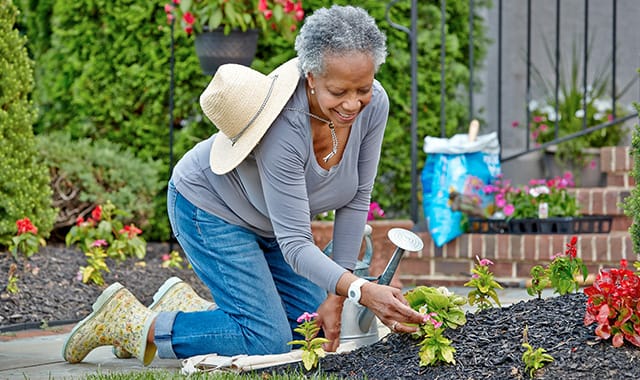
Fast forward to 2021, as technology has advanced, so have medical alert systems. Innovation now allows a user to choose a system that will monitor them outside of the home as well as in the home. The newer models really help people to live more independently, without need for a caregiver, for as long as possible.

Imagine having a heart attack or stroke while home alone or falling when reaching for an item in the cabinet--how would you or your loved one get help if you're unable to get to the telephone? During emergencies, time is of the essence, and that's where a medical alert system comes in.
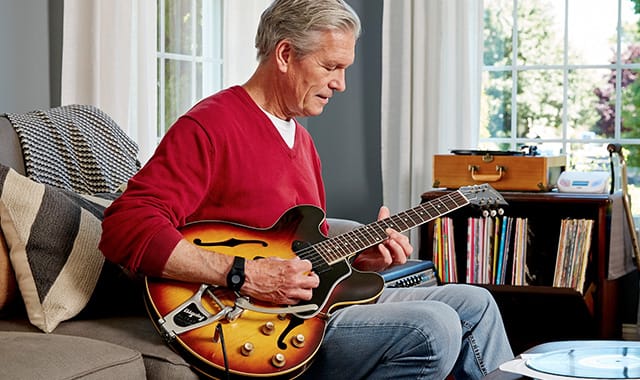
Medical alert devices can signal for help if you have an emergency or a situation that requires immediate attention.
The user wears a pendant or wristband device that has a button you can press which summons help when needed, and some systems even have capabilities to detect a fall, so that you don't even have to press the button. Other devices have mobile options like GPS-tracking abilities so you can wear your pendant away from home.
You can save thousands of dollars in long-term care costs by having a medical alert system instead of having to hire a full-time caretaker. Plus, a good medical alert system can save your life.
As technology advances and changes, so do medical alert systems.
There are many medical alert options to choose from. It's important to determine your needs, budget, and the quality of equipment and services offered. Below, we cover everything from how each feature works, to pricing, and picking a system that best matches you or a loved one's lifestyle.
How to find the best medical alert system in 2021
There are many things to consider when searching for the best medical alert system in 2021, and it's important that you choose one that best fits your lifestyle.

Perhaps you're a gardener and spend a lot of time in your yard--in that scenario, you'd want an emergency alert system with cellular and GPS capabilities. Rest assured you'd have the coverage you need in case an emergency happens outside of your home.
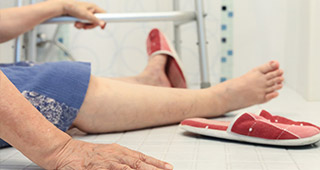
If you're prone to falling or have a fear of not being able to press your button in an emergency, you should consider a unit with automatic fall detection, which alerts the monitoring company automatically if a fall occurs.

Or maybe you have some health issues that require monitoring but you still enjoy an active lifestyle. If you're still driving or leaving your home frequently, a cellular alert system with a GPS tracker would be your best match.
If something happens away from home, the system will send the medical alert company your location. Also, if you have a relative with Alzheimer's or dementia, a GPS tracker could be of utmost importance in determining their location should they wander away from home.
Once you determine which functions are important in your medical alarm, you'll want to make sure that you choose a company with a good reputation. Unfortunately, seniors are often targets of scams. You can investigate a company by determining whether or not their customer service meets the satisfaction of its clients.
Here are some things to look for:
-
Does the equipment work?
If there are frequent complaints from customers that the medical alert company didn't respond when a button was pressed, that's a surefire clue that you should do business with another company.
-
Is it easy to cancel or are you locked into a contract?
There are many reasons you may need to cancel. For one, the service may prove unsatisfactory. If you're locked into a contract, a company doesn't have to earn your loyalty. They may take longer to respond or worse yet, not at all. Another thing is that your situation or needs may change. Steer clear of long-term contracts and go with a company that offers an easy cancellation should you require it.
-
Is the monitoring center certified and U.S. based?
Any reputable medical alert center will be certified, meaning they undergo independent and rigorous testing of its equipment and services to ensure they're held to the highest standards. When your medical alert service triggers a call, you want a reassuring, calm voice at the other end - one that hopefully speaks clear English.
-
Is the response time fast enough?
If you notice complaints that a company took minutes to respond to a call trigger, that's too long. During an emergency, you want fast, reliable service. Every additional second it takes to respond could be life changing, which is why the golden hour (insert golden hour picture) is so vital.
-
Is the customer service department friendly?
When evaluating a medical alert monitoring company, you want to make sure their customer service department has high praise and ratings from customers. You want them to address any concerns or questions you may have.
-
Is the system affordable?
Many seniors live on a fixed income. You want the best range of services for the best price you can find. A typical price span is $20 to $40 a month. Added services, like GPS and fall detection capabilities, may cost slightly more. You also want to ensure that the overall cost doesn't have any hidden fees.
Our Top-Rated Medical Alert Systems for 2021
Review and compare our top-rated medical alert systems of 2021. Each has something different to offer and serves a variety of needs. Whether you need a traditional landline system, a GPS alert system for your active lifestyle, or an innovative smart watch solution, we have you covered.

Best Mobile GPS Alert System of 2021
Mobile Guardian
Product OverviewOur choice for the best mobile GPS alert system is the Mobile Guardian. It offers you protection whether you or your loved one is at home or on the go. It'll even monitor you when you're out driving. Because of this, it's a great choice for people with active lifestyles.
The Mobile Guardian response system has a built-in GPS and is lightweight and easy to use. You activate this wearable emergency response system by pressing an emergency button that will call for help. The system then connects you with a trained operator who will quickly assess your situation and, if needed, dispatch emergency help to you as quickly as possible.

If you feel you don't have an emergency, but just need extra help, the monitoring center will call someone you've designated on your list (usually a family member, friend, or neighbor). The monitoring center is open 24/7 and receives calls through a U.S. cellular network.

Features
Mobile Guardian was designed so that you could receive help wherever you are. The device comes with GPS-tracking, which enables your medical alert company to view where you're located in the event of an emergency.
- The system features two-way communication between you and the call center.
- The Mobile Guardian GPS alert system is powered through the AT&T cellular network, which offers wireless access to a certified and accredited monitoring center. 100% of its trained operators are located here in the U.S.

Options / Extras
With Mobile Guardian, you have more options to enhance your protection. These include additional buttons that allow you to protect more people in the home and wall buttons that work together with the base station to offer up to 600 feet added coverage.

You also have the option of adding a pendant that will alert the monitoring center in case you collapse or fall and you're unable to push a button. For the best peace of mind, you can get a lockbox to store the keys to your home so that responders have a way to enter your home if you're unable to unlock the doors during a crisis.

You can even add a car charger to charge your system while you're driving. To protect your system and your investment, you can also add a protection plan that will offer coverage in case your system is damaged from a power surge, stolen, or is otherwise lost.
Range
The Mobile Guardian offers coverage of up to 350 feet from the charging crate to your medical device button. If you leave home, simply bring the portable device with you so that you continue to be covered.

Cost
-
Basic
$49.95
-
Quarterly
$149.85
-
- Free Ground Shipping
-
Semi-Annual
$299.70
-
- Free Lockbox
- Free Ground Shipping
-
Annual
$549.45
-
- Free second button
- Free Lockbox
- Free Ground Shipping
- Fall Detection: $10 per month.
- All subscriptions include the basic equipment of your choice of wearable device and the base station.
Top 3 reviews for this system
"Worth every penny, even when we do not have to use it. I keep it around my neck, but I have never had to use it except to activate it when it first arrived. It gives me self assurance that someone is watching over me."
"Fast response. While I was away at work, my brother took a walk down the block. He fell and was unable to get up, Fortunately he was carrying his Mobile Guardian and help came in a matter of minutes."
"Hi I had an emergency last week and went to the ER I found your guardian so prompt. Great to have that response. THANKS."
Overall Synopsis
The Mobile Guardian is a great choice if you or your loved one has a more active lifestyle and spends some time out of the home.

Longest Range Alert System of 2021
Classic Guardian
Product OverviewThe Classic Guardian is one of the lowest-cost long range alert systems on the market. It's also one of the best at-home monitoring devices.
The system connects to your landline telephone and the base station works in tandem with your wearable medical alert help button. The Classic Guardian is best-suited for people who spend most of their time at home. It offers long-range protection of 1,300 feet from where you place the base station.
Features
The Classic Guardian has one of the longest coverage areas to ensure access throughout your home. This medical alarm offers protection 24 hours a day, 7 days a week through your home's landline.
If you have an emergency or need help, simply press the button to connect to one of Medical Guardian's U.S.-based trained operators. Once you've pressed the medical alert button, a wireless signal is sent to the base station, which uses your landline telephone to connect to Medical Guardian's emergency monitoring center.

The emergency call button has a built-in speaker from which you can communicate directly with the monitoring center's operators, who will then get you the help you need. If you're unable to speak, the operators will automatically send help to your home.

- Battery: 32 hours
- In the event that an unexpected power outage affects your home, the Classic Guardian comes with a 32-hour back-up battery to offer you continued, uninterrupted protection.
Options / Extras
With Classic Guardian's landline alert system, you can choose a neck pendant or a wrist band for your wearable device. You also have the option of purchasing additional medical alert buttons. This is a great thing to have when you need to protect more than one person in the home.

You can also increase your peace of mind by adding a fall alert pendant to your package. This can alert the monitoring center automatically if you have a fall. If you need coverage beyond the basic 1,300 feet, you can also add a wall-mounted button which will increase your coverage to 2,000 feet.

A weatherproof lockbox is also offered so that emergency responders can quickly enter your home in case of an emergency. If you're unable to reach the entrance to your home, it's vital for emergency personnel or family members to have access to your home.

The Classic Guardian also offers a voice-activated wall button which contacts the monitoring center when the words “Call Medical Guardian” are spoken twice or when the cord is pulled.

Finally, a protection plan is available in case your medical alert system is stolen, lost, or damaged.
Range
1,300 feet from button-to-base station

Cost
-
Basic
$29.95
-
Quarterly
$89.95
-
- Free Ground Shipping
-
Semi-Annual
$179.79
-
- Free Lockbox
- Free Ground Shipping
-
Annual
$329.45
-
- Free second button
- Free Lockbox
- Free Ground Shipping
- Fall Detection: $10 per month.
- All subscriptions include the basic equipment of your choice of wearable device and the base station.
Top 3 reviews for this system
"I only used it once but I was glad I had it. Fell in yard and if I hadn't had it I don't know when I would have been found."
"Your fast and courteous service gave me peace of mind, when I could not be there for my mother."
"After my Dad passed away in April, we wanted to make sure our Mom was safe and sound. She wants to stay in her house but being all alone was a major concern for us. We decided to get her the Guardian for her 79th Birthday and paid the year in full. It has been worth every penny..."
Overall Synopsis
The Classic Guardian offers great protection for seniors who are confined to the home a lot. It's considered the best long-range alert system and is affordable and easy to use.

Best Medical Alert Smart Watch of 2021
Freedom Guardian
Product OverviewThe Freedom Guardian offers protection at home and on the go. It's considered the most reliable smartwatch for seniors on the market. Freedom Guardian is a perfect monitoring system for older adults who still want the freedom to maintain an active lifestyle.
With this smartwatch, seniors have a trendy and hip option that has one-touch access to a 24/7 alert monitoring system. This medical smartwatch offers an inconspicuous way to have full emergency monitoring protection as well as a messaging app, appointment reminders, and weather forecast.

It's lightweight, easy to navigate, user-friendly, and has large touch screen icons if you have trouble with your vision. The Freedom Guardian is the best medical alarm alternative to bulkier monitoring options.

Features
Freedom Guardian has advanced location tracking, which is able to send your location to Freedom's dispatchers in case you need help. This GPS-enabled smartwatch helps you to stay connected to your loved ones with hands-free communication via SMS voice to text messaging.
If you have an emergency or need help, simply press the button to connect to one of Medical Guardian's U.S.-based trained operators. Once you've pressed the medical alert button, a wireless signal is sent to the base station, which uses your landline telephone to connect to Medical Guardian's emergency monitoring center.

Freedom Guardian also delivers audible alerts and reminders to help you stay on track, whether you need help remembering to take your medications or important appointments. It'll even alert you to changing weather conditions.
And, no need to worry about running out of battery with Freedom's low-battery notifications. It alerts you when your smartwatch's battery needs to be charged by displaying low battery alerts on every screen. Loved ones will also feel at ease knowing they can review whether or not you've requested help from the alert center.

- Battery:
- 48 hours, depending on usage.
Options / Extras

You have the option of a white or black watchband for your smartwatch.

The Text-to-Speech and Messaging Reminders & Alerts apps are available as an upgrade for additional $5/m.

You also have the option of adding a lockbox to your package, which would allow you to place a key so that emergency responders can enter your home, should you need help and are unable to answer the door.

Finally, a protection plan is available in case your smartwatch is stolen, lost, or damaged.
Range
Because the Freedom Guardian is an all-in-one alert monitoring system, you have help available to you wherever you are, as long as you're wearing your watch.
Cost
-
Basic
$44.95
-
Quarterly
$134.85
-
- Free Ground Shipping
-
Semi-Annual
$269.70
-
- Free Lockbox
- Free Ground Shipping
-
Annual
$494.45
-
- Free Lockbox
- Free Ground Shipping
Top 3 reviews for this system
"Got on the phone with Tyler. Was able to answer all my questions about the Freedom Guardian. They have definitely received a customer for life!"
"Nice features, comfortable to wear and stylish."
"So far, I love it!"
Overall Synopsis
The Freedom Guardian is perfect for active seniors who want to maintain their freedom and lifestyle. If you still enjoy running, fishing, or life on-the-move, the Freedom smartwatch is the best choice. It's also ideal for family members who want an easy way to stay in touch with their loved ones.
It offers additional functionality to help you stay up-to-date with appointments and is easy to use in case of an emergency. To alert the monitoring center, simply hold the side button for 3 seconds and help will come to you. The center can automatically determine your location via GPS tracking.
Best All-in-One Alert System of 2021
Active Guardian
Product OverviewThe Active Guardian medical alert system is a portable monitoring device that has both WiFi location technology and GPS capabilities to accurately pinpoint your location. It's an all-in-one wearable device that features two-way communication through a pendant.
Active Guardian offers the most advanced protection for you or your loved one, whether at home or one the go. It also has the longest battery life of any Medical Guardian mobile alert system. It's lightweight and accurate, offering dependable service when you need it.

The Active Guardian is a great solution for seniors who have active lifestyles both at home and in the community. Active Guardian can be an important tool to have for seniors who want to maintain their social connections. Help is just a button away when you need it.

Features
An Active Guardian subscription includes AT&T cellular service to provide you with a wireless, 24/7 alert system. GPS location-tracking and WiFi alerts the monitoring center of your exact location when you press the device's button.
When the button on your two-way communication pendant is pressed, you're connected to a trained dispatcher. You can then communicate your needs to quickly receive the help you need
It's also good to know this device has a high waterproof rating that allows it to be worn in the shower or bath. Most falls in the home happen on slippery surfaces, so you have added peace of mind.
- Battery Life:
- The Active Guardian has a battery life of up to 5 days. The device will flash a red light when the battery is low. It takes just 3 hours to charge the Active Guardian back up again.
Options / Extras
You have the option of adding fall detection with this monitoring system and The Active Guardian is sophisticated enough to distinguish normal movements from falls.
Because of this, it's the most reliable alert system where fall detection is concerned. In case you're worried about emergency personnel breaking windows and doors to get to you, you may also want to add a weatherproof lockbox to your package.
This will enable you to place a key for responders in the event that help is needed. As with all of Medical Guardian's alert systems, you also have the option to add a protection plan in case your system is damaged or stolen.
Range
Because this GPS-alert system has cell phone technology, you're covered as long as you're wearing the device.
Cost
-
Basic
$39.95
-
Quarterly
$119.85
-
- Free Ground Shipping
-
Semi-Annual
$239.70
-
- Free Lockbox
- Free Ground Shipping
-
Annual
$439.45
-
- Free Lockbox
- Free Ground Shipping
- Fall Detection: $10 per month.
- All subscriptions include the basic equipment of your choice of wearable device and the base station.
Top 3 reviews for this system
"Nice to know you have a contact if an emergency arrives. Thankful for this device."
"As my husband's caregiver, I love this device. It gives me peace when I'm away that he's within a button to call for help!"
"IT WORKS! I was able to use the alarm when I had fallen and I was out of state. They immediately responded."
Overall Synopsis
If ease of use, portability, and dependability are important factors to you in a medical alert monitoring system, then the Active Guardian is your best choice.
Between its WiFi and GPS capabilities, you have constant, accurate, and reliable monitoring wherever you are — even if you're traveling.
Its long battery life ensures constant, uninterrupted service for up to five days. Active Guardian is a great option for seniors who continue to live an active lifestyle.

Best At-Home Fall Detection System of 2021
Home Guardian
Product OverviewThe Home Guardian medical alert system doesn't require a landline telephone. It uses a cellular network that wirelessly connects you or your loved one to a monitoring center.
The system offers continuous, uninterrupted protection seven days a week. The wearable, waterproof emergency button comes as a pendant or a wristband and works in connection with a base station.
When you have an emergency, a single press of the button will call the center and connect you to a trained emergency operator. The operator will already have your medical history and will assess your situation with you.
When you initially subscribe to Home Guardian, you'll assign certain family members or friends within your Care Circle. Once you initiate a call to Home Guardian, together with you, they'll decide whether to send emergency services or call someone in your Care Circle to get you help.

While the basic subscription of the Home Guardian doesn't include fall protection, for a mere $10 per month, you can add automatic fall protection. The Home Guardian system offers the best at-home fall detection of any medical alert system when the fall detection option is chosen.

Automatic fall detection is an important option when considering your medical alert system. The CDC reports that one in four senior citizens falls each year in the U.S. This equates to 29 million falls, 800,000 hospitalizations, 3 million visits to the ER, and 28,000 deaths. Those statistics highlight the importance of fall detection when choosing a medical alert system in the home.
The best thing about fall detection is that if you're unable to press the pendant's button if you fall, the pendant will automatically detect your fall. It has the ability to distinguish normal movements from a fall. Seniors who have fall detection with their alert system feel more confident about going about their day as usual.
Features
Home Guardian operates through AT&T's cellular network service which is included in the monitoring service's monthly fee. This means you don't need a landline telephone for your monitoring system.
It also means that if you leave your home for an extended period to visit family or another reason, you just have to bring your Home Guardian with you and you're still protected by reconnecting in a new location.
The system offers you direct two-way communication with the center's trained emergency operators, who are all 100% U.S.-based. The alert system has built-in speakers that you can adjust to your comfort level.
- Battery: 30 hours
- In the event of a power outage, Home Guardian has a 30-hour backup battery to offer you continuous protection.
Options / Extras

You can choose more options to add to your basic Home Guardian subscription. These include:
- additional wearable buttons in case more than one person in the family needs protection;
- a wall-mounted button;
- a fall alert pendant;
- a lockbox to store a key to your home so that emergency responders and family members can enter your home if you're unable to reach the door;
- and a protection plan to protect against theft and damage.
Range
Up to 600 feet from the base station.

Cost
-
Basic
$34.95
-
Quarterly
$104.85
-
- Free Ground Shipping
-
Semi-Annual
$209.70
-
- Free Lockbox
- Free Ground Shipping
-
Annual
$284.45
-
- Free second button
- Free Lockbox
- Free Ground Shipping
- Fall Detection: $10 per month.
- All subscriptions include the basic equipment of your choice of wearable device and the base station.
Top 3 reviews for this system
"So far, we are happy with the system. Mom is starting to do more activities after her accident and the system is working well. She wears the watch and the necklace."
"I fell a few days ago and used my medical alert to ask for EMS . They responded and called them for me quickly."
"Mom has used her button twice when she fell and the paramedics came quickly. It provides peace of mind for me to be able to leave her. So glad to have her."
Overall Synopsis
The Home Guardian offers the best fall detection option of any medical alert system on the market in 2021. If you or your loved one is medically fragile or prone to falls, this is the best alert system for you. It's easy to use and when the fall detection option is added, the system will automatically call the monitoring center for help in the event of a fall.

Best Room Monitoring Sensor Alert System of 2021
Family Guardian
Product OverviewA Family Guardian medical alert system goes well beyond the standard medical monitoring system. A basic monitoring system is designed so that if a person suddenly has a need for help, they can call. But, what if you or your loved one is unable to call or falls ill in bed?
Family Guardian offers proactive monitoring for situations just like that. It uses three safety sensors within the home so that family members, caregivers, and friends are able to monitor a loved one throughout the day. The sensors are placed in the three areas that are used the most by your loved one. The sensors help to record the activity of the person being monitored and it sends this information via email or text to you or whoever is designated to receive the information.
If you or another designated person feel your loved one hasn't done their normal routine, or if a sensor doesn't detect them in the kitchen by their usual meal time, you can either go check on them yourself or have the monitoring center do a wellness check. If you're unable to go to your family member, you can request that emergency medical technicians check up on them.
Your loved one will still have an emergency button in case they realize they have a problem and need help. All they have to do is press the button, and our center will answer their call for help within seconds and get help on the way.

The Family Guardian is a perfect monitoring system for people who spend a lot of time at home and are more prone to medical problems. It's also a great system for seniors who don't have a landline phone.

Features
The Family Guardian has the longest range of any in-home monitoring system. This system includes the base console and your choice of a necklace or a wristband button, and three sensors.
You don't need a landline to operate the system as it works through AT&T cellular service, which is included with the Family Guardian monitoring system. When the button on the device is activated, you or your loved one will be connected to an operator right here in the U.S.
- Battery: 32 hours
- The base station has a 32-hour battery backup in the event of a power loss.

Options / Extras
You have the option of adding the following accessories to your Family Guardian package:
- additional medical alert buttons to offer more than one person protection;
- a fall alert pendant so that you or your loved one has automatic fall protection;
- a wall-mounted button that also extends the coverage area by 700 additional feet;
- a voice-activated wall button;
- a lockbox for your key so loved ones or emergency personnel have access to the home;
- and a protection plan in the event your monitoring system is damaged or stolen.
Range
1,300 square feet

Cost
-
Basic
$79.95
-
Quarterly
$239.85
-
- Free Ground Shipping
-
Semi-Annual
$479.70
-
- Free Lockbox
- Free Ground Shipping
-
Annual
$879.45
-
- Free second button
- Free Lockbox
- Free Ground Shipping
- Fall Detection: $10 per month.
- All subscriptions include the basic equipment of your choice of wearable device and the base station.
Overall Synopsis
The Family Guardian is the most advanced monitoring system if you want to add additional layers of protection. Family members and caregivers don't have to rely solely on their loved one sending a signal in case something happens.
Active monitoring through sensors placed in the home can help alert loved ones that something isn't right. If a sensor doesn't detect movement in the bedroom after a night of rest, this could be a signal that something is wrong.
This system is the full package when it comes to medical alert monitoring.
The different types of medical alert systems explained
As you get older, you're more prone to illness, accidents, and falls which can render you incapacitated, making it harder for you to get help.
This is where a medical alert system comes in. It enables you or a loved one to continue living an independent life by offering you a device that allows you to ask for help if an emergency occurs. There are several different types of medical alert systems, each with distinct advantages and disadvantages.
Cellular medical alert systems were created with active seniors in mind. They're also great for people who have no landline phone. This type of monitoring system will work anywhere mobile phone service is available.
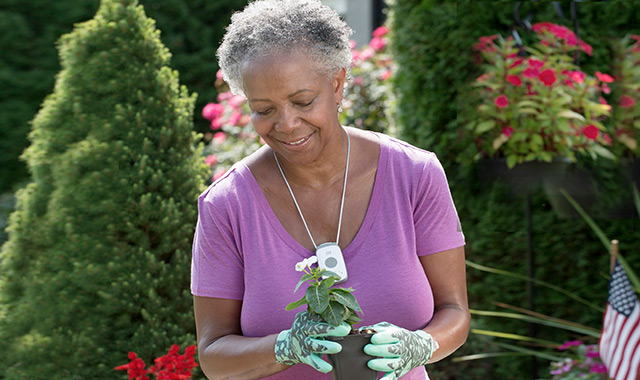
Cellular alert systems typically offer all-in-one protection that either sends help with the press of a button or is voice-activated. GPS and Wi-Fi monitoring systems take it a step further.

While these also usually use cellular service, the alert center is also able to track your precise location so that help can be sent to you quickly, wherever you are. These sometimes come in your choice of a pendant or a smartwatch, which brings the added benefit of mobile apps such as alerts and reminders.
The final type of medical alert system is the bedroom monitoring system with sensors.
Motion-activated sensors are placed in certain areas of the home, typically areas where routine activities take place. This type of monitoring system alerts caregivers and loved ones when a person's pattern changes. For instance, if you get a monitoring system for your dad and no movement is detected by a designated time, this could mean something's amiss and it's time to do a wellness check.
There are other variations of medical alert systems, but these are the most popular. You'll want to take into consideration the lifestyle, general health, activity level, and other factors about the person being monitored before deciding which one is best.
How do medical alert systems actually work?
If you're considering a monitoring system for you or your loved one, you've probably wondered how medical alert systems actually work.
Some devices are for home-use only, that is, for people who spend most of their time alone at home and rarely leave home alone. At-home units work in tandem with landline telephones or cellular service, depending on the type of unit. In case of a power outage, they also typically come with a battery backup. This type of unit typically has a button that you press when you need help from the monitoring center. You can usually add on services, like fall detection, to increase the amount of protection you have.
Other devices are better suited for people who live more active lifestyles. For instance, gardeners, seniors who still drive, and people who still get out and about on their own would do best with a mobile unit or a smartwatch. These units usually have cellular service included so that you receive coverage wherever you go.
- Automatic fall detection often comes with mobile alert systems and many are GPS-enabled so that the center can determine your precise location in the event of an emergency and you're unable to respond.
- Mobile units sometimes have buttons that can be pressed during an emergency situation, as well as voice-to-text activation for hands-free communication. You can usually choose a wearable pendant device or a smartwatch.
- A smartwatch usually comes with more functionality than a pendant, like weather forecasts and event planners that offer alerts and reminders so you don't miss anything on your schedule.
Help in 3 Simple Steps
Whatever unit you choose, once you activate a call to the monitoring center, you're quickly connected so that help can get to you fast.
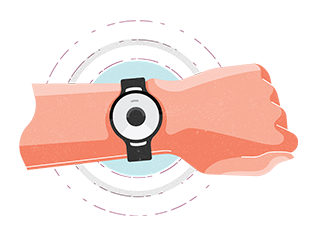
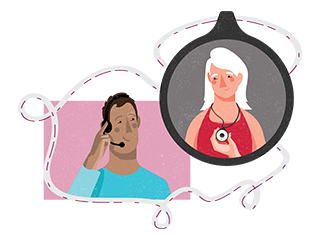
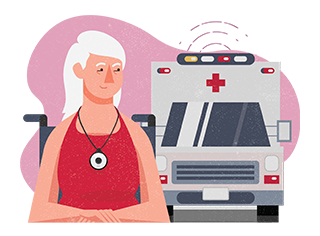
When you use an accredited monitoring center, such as Medical Guardian, you're connected with a trained, emergency dispatcher or operator.
All you or your loved one has to do is to explain the situation which has prompted the call. The operator will also have access to your medical history and location, which they can use to determine the kind of help you need. The dispatcher will send either a designated loved one or friend or emergency responders to your aid.
If you're unable to talk or the operator can't hear you, they'll call your phone number to see if you're okay. If they can't reach you, they'll automatically send emergency medical help to aid you.
The operators are highly trained to determine whether there is an actual emergency, or simply a situation that warrants help from neighbors, family members, or friends. When you sign up, you designate people in your Care Circle that will get notified in this type of situation. The monitoring center keeps this list on hand for whenever the need arises.
Now that you better understand how medical alert systems work, you can more easily determine which one is right for you or your loved one.
Which Features Matter Most in a Medical Alert System?
The features of a medical alert system vary from system to system.
While each has unique benefits, there are a few considerations that are absolutely vital no matter which system you choose. Here's what you'll want to look for:
- Monitoring Center Response Time: During an emergency, seconds count. So you'll want to make sure you choose a monitoring center that has a stellar reputation for fast response times. Check reviews to learn what customers have to say about how quickly their situation was handled. Choose a medical alert system you can count on.
- Mobile vs. Home: The first thing you'll decide in terms of individual needs is the type of unit that best serves you or your loved one. Seniors who spend most of their time at home and have low activity levels may be comfortable with a home monitoring system. However, seniors who are still active out of the house and actively participate in the community would be better served with a mobile alert system.
- Comfort/Ease of Use: You'll want to find out how previous customers feel about a device. Is it comfortable? Or, is it so bulky and uncomfortable that a customer doesn't wear it as they should? Aim for something that'll be comfortable enough that you don't give a second thought about wearing it. You'll also want to be sure it's user-friendly and easy to operate. Technology can be difficult for some seniors.
- Fall Detection: Some devices offer fall detection as an additional service and some are built-in. While some people may fall throughout their lifetime, falling is particularly common amongst elderly and disabled people. Some falls happen because of balance issues, malnutrition, dehydration, arthritis, or even medication interactions. The general health of an older person may also cause them to fall. In any case, you probably will want to include it as part of your monitoring service as falls are the leading reason seniors press their medical alert button. While no one can prevent a fall, a fall detection system can get immediate and reliable help when it's needed.
- Battery Life: Does the device you're considering have a backup battery? Is the battery life long enough to allow uninterrupted service for a reasonable length of time before needing to be recharged? If a system needs to be charged on a daily basis, it's best to find a system with a longer battery life. You want to make sure you don't end up with a dead battery when you need it the most.
- Waterproof/Resistance: You may want to consider a device that you don't have to take off in the bathroom. Many medical alert systems have devices that are water-resistant so you have constant protection while showering or bathing. There are varying degrees of water resistance, such as medical alert button pendants which can be worn in the shower.
- Customer Service: If you need help understanding how your system works, requesting new parts, or any other customer service related issue, it's important the medical alert company offers stellar customer service.
- Overall Monitoring Center Service: You'll want to select a medical alert service that offers monitoring 24 hours a day, 7 days a week and is based in the U.S. One can't predict when an emergency will occur and a service doesn't do any good if they're not there when you need them. You will want to find out what others have to say about the monitoring operators. Are they friendly and helpful when called upon? Are they trained to deal with emergencies? There are certifications to ensure monitoring centers meet the highest set of standards, such as UL listed, TMA Five-Diamond certification, and ESA membership.
At Home and Cellular Medical Alert Systems
When you or a loved one needs monitoring, an at-home medical alert system is a good option when you spend most of your time at home. Home monitoring systems come with a couple of different options.
The first option is for seniors who have a landline telephone. An at-home alert monitoring system like Classic Guardian connects to your landline phone. The system has a base station that works in connection with a wearable device that has a button.
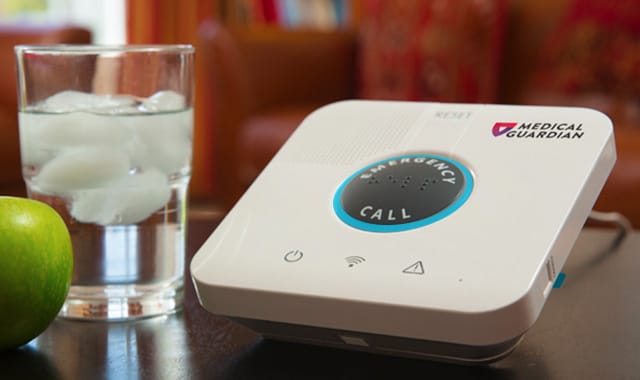
You or your loved one will press the button to alert the monitoring center if a problem arises. Once pressed, the device will connect to a trained operator, which will determine and dispatch the type of help needed. This is usually the most economical option available for a home medical alert system.
However, in our modern age, not all homes have landline telephones. Many people have moved towards cell phones. As such, medical alert systems are also offered by way of cellular service. Cellular options are also better for seniors who spend more time outside in the yard or in town.
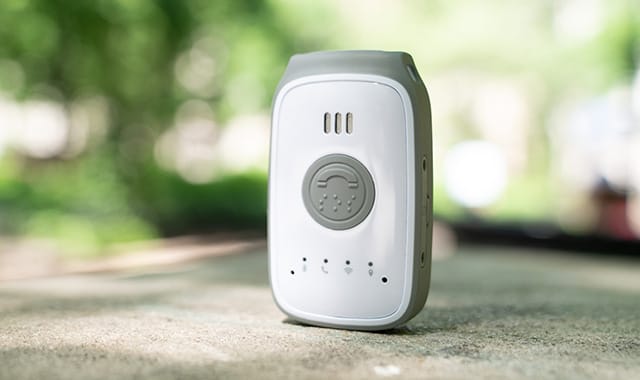
Some services, like the Home Guardian, give you the option of a pendant device or a wrist band. Once again, you simply press the button when help is needed. You'll then be connected to a monitoring center who will get help to you quickly. The beauty of most home cellular medical alert systems is that you can bring the system with you if you move or visit someone for an extended time. They'll work wherever you go by simply reconnecting at a new location.
Mobile and GPS Medical Alert Systems
Mobile and GPS medical alert systems offer emergency monitoring seniors and medically-fragile people who live alone and want to maintain their independence.
Medical alert systems come with a device that has a button to press when help is needed. It sends a signal to a monitoring center, who assesses the situation. Then, depending on you or your loved one's situation, they may dispatch emergency personnel and/or alert family members and caregivers to get help.
Traditional medical alert systems provide coverage inside of your home and perhaps even your yard, depending on the range of the system. These types of systems often depend on a landline telephone to function.
But mobile and GPS medical alert systems are designed to operate outside of the home. Most are powered through a nationwide cellular network and don't require landline telephones.
Some mobile alert systems, like the Mobile Guardian, have built-in GPS capabilities that can pinpoint your location wherever you are. With this unit, you just bring the mobile base station wherever you go, and it offers protection within a certain range.

It doesn't matter if you have an emergency at home, heat sickness while walking around the neighborhood, or fall ill while driving, this type of medical alert system can get help when you need it.
A mobile or GPS medical alert system can be highly beneficial if you live an active lifestyle. It allows life to go on unimpeded while offering protection in case of an emergency situation.
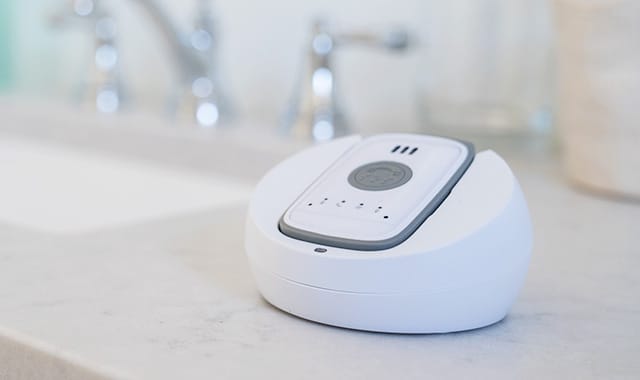
Other types of mobile alert monitoring have more advanced capabilities that include WiFi. An example is the Active Guardian. This type of unit is an all-in-one unit, meaning you don't have to be near a base station for the device to work. A single press of the button will send help when you need it, wherever you are.
What is a medical alert smart watch?
Medical alert smartwatches are the latest, innovative technology in monitoring systems.
Many seniors have medical issues that warrant keeping a close eye on. But, they're not ready to give up their independence and want to maintain their freedom.
Smartwatches offer seniors the type of protection they need but allow them to maintain an active lifestyle.
Medical alert smartwatches, such as the Freedom Guardian, come with a GPS alert system that can send you or your loved one's exact location to a monitoring center in the event of an emergency. As long as your location is within the U.S., a dispatcher is able to pinpoint where you are.
These types of smartwatches work just as other medical alert systems do. The wearer simply presses a button and an emergency call center speaks to you through a two-way speaker.

The great thing about these GPS-enabled watches is that if the dispatcher can't understand you or you don't respond, your location will be sent to their monitoring center so help can be sent immediately.
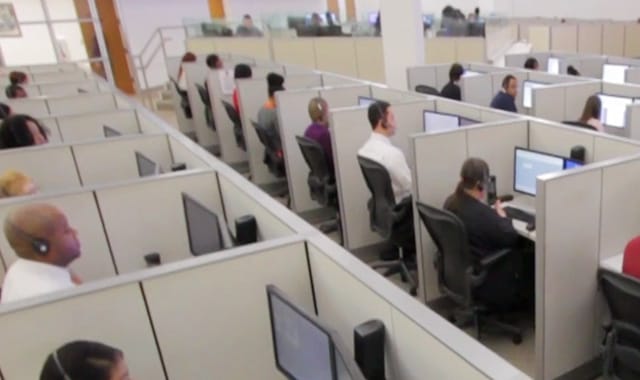
Some medical alert smartwatches come with additional functionality. The Freedom Guardian, for example, also has a planner to keep track of important dates and appointments. It even comes with a weather forecast so you can stay apprised of changing weather events.
Family members and caregivers alike prefer this type of smartwatch because they can easily communicate with their loved one. The wearer can send and receive messages. Family members or caregivers also receive a notification that their loved one has read their messages, acknowledging they're responsive.
Many advocates of a smartwatch medical alert system like them because they're discreet and trendy. Active older adults simply want to live life on their terms. Smartwatches allow them the freedom to live life just like everyone else.
How does automatic fall detection work?
Automatic fall detection is a common option for many types of medical alert systems.
Fall detection is usually available as a feature with home monitoring systems as well as with mobile monitoring systems.
Falls happen frequently in seniors while showering, reaching for an item in the pantry, or simply getting up from a seated position.
Automatic fall detection offers greater peace of mind to you or your loved one and adds protection in case you're unable to press the call button.
A typical emergency alert device is a pendant. A pendant that is outfitted with fall detection has sensors and software that is able to detect when you move. The sensors are able to detect movement that is more like a fall, rather than daily activity.
When a fall is detected, it will send out a call to the center and an operator or dispatcher will do a wellness check to see if you're okay. Based on the information you tell them, they may send emergency response personnel or a designated loved one or neighbor to help.
When you consider that 2.8 million older adults are treated in emergency rooms each year due to falling, automatic fall detection is a good thing to have in your medical alert arsenal. Most people would agree that the small monthly fee is worth the peace of mind it offers.
When I press the button, what happens next? How do I get help?
The help button on your medical alert system is designed for you to easily get help when you need it. If you have a medical problem, a fall, or another issue that requires assistance, all you have to do is press the help button.
When the help button is pressed, the monitoring center receives a signal within seconds. The monitoring device, which is usually a pendant, has speakers that allow for two-way communication between you and the emergency call center.
When a signal is received by the center, they'll quickly reply and ask if you need help. The operator will be trained and have access to your medical history.
Once they've assessed your situation, they'll be able to figure out whether to send 911 help or help via your designated contacts, which is usually a family member, friend, or a neighbor.
What's the difference between Medical Alert Monitoring Service and 911?
If you have an actual emergency, there's no doubt that you want 911 to respond.
But what happens if you can't reach your phone or you're unable to speak well enough for 911 operators and responders to understand you?
A medical alert monitoring system is able to monitor you 24 hours a day, 7 days a week. With the help of a device, you can quickly ask for help with a monitoring system. All you have to do is press a button.
What's more, the alert center is trained to send help immediately if you can't respond or they can't reach you. Alternatively, 911 would not have your family members or caregivers names and numbers on file. On the other hand, a medical monitoring operator can contact them based on your instructions and the urgency of the situation, potentially saving you thousands in emergency costs.
Some monitoring systems also have fall detection options so that if you experience a fall, the center automatically checks to see if you're okay and sends help if needed. Plus, an alert system, like Medical Guardian, has important medical information about you on file. So, they will not only be able to get dispatchers to you quickly, they'll be able to relay vital information about your health history.
A 911 call center doesn't monitor you 24/7. The 911 service center isn't able to detect when you have a problem. A medical alert monitoring device offers a solution that overcomes the limitations of 911. Together, with your local 911 EMT providers and people on your designated call list, each can play an instrumental part of saving your life, should an emergency occur.
For seniors or the elderly, will a medical alert system remove the need for assisted living?
Every senior's health and circumstance is different, so there's no clear, concrete answer to this.
However, many elderly people benefit from a monitoring system that won't break the budget. Assisted living is a significant investment that can run thousands of dollars a month.
And while you can't put a price on the safety of you or your loved ones, some seniors simply don't have the resources for assisted living. And many want to keep maintaining their independence for as long as possible.
A medical alert system isn't a surefire replacement for supervised care. But, in some circumstances, a medical alert system may be the answer to your prayers. If the senior in question is able to remain somewhat mobile in the home, a medical alert monitoring system can be an affordable alternative to expensive, assisted living.
With a monitoring system in place, they simply need to press a button and help is just seconds away. When the monitoring system receives a signal, they'll send emergency help to you or your loved one's aid within the golden hour, or the most crucial time for help to arrive.
Research shows that when help arrives within the first hour after an emergency, treatment is more likely to save a life. This is known as the golden hour.
Why do medical alert systems have monthly fees?
When you consider all that a medical alert system offers, the cost is well justified.
Plus, it's an affordable alternative to caregiving which allows you or your loved one to live an independent life. For reference, the average annual cost of home health aides is $40,320, or about $110 per day. A medical alert system averages only about one dollar a day, which is a fraction of the cost.
While the medical alert system looks simple and is easy to operate, a lot of technology goes into making the equipment work as it does. Additionally, it pays for constant monitoring in the event of an emergency. Experienced, trained operators are available every hour of the day or night. What you're really paying for is the service. When it comes right down to it, it pays for your peace of mind. Can you really put a price on that?
Are there medical alert systems with no monthly fees or one-time purchase?
There are a few alert systems that have no monthly fees or are available with a one-time purchase. But, the best medical alert systems are those with monthly subscriptions because they offer more services which translate to more comprehensive protection.
For instance, 911 systems that generally come without a monthly subscription rarely offer fall protection. And, this is probably one of the most important features of a dependable alert system because one in four seniors have a fall each year.
911 devices also often don't have the option to choose a cellular-powered device. This means it'll only cover you within the range offered within your home. You won't have the freedom to be out and about as much as you'd like. What's more, 911 alert systems are often complicated to install and operate and you don't have access to 24-hour customer service. Most medical alert systems offer continued uninterrupted customer service.
By far the worst thing about 911 monitoring systems is that you may not have a system that has real-time, two-way communication through your device with an emergency response dispatcher. Some calls are recorded and forwarded to the 911 center. This could mean precious moments lost in an emergency. Moments that could possibly save a life.
On the other hand, some 911 devices automatically call 911, whether you have an actual emergency or not. Some situations only require a friend or a relative to come to your aid. If your 911 device calls 911 for every situation, they may be slow to respond when you have a more urgent emergency.
A traditional medical alert monitoring system like Medical Guardian is a more practical solution. Not only does it offer automatic fall protection, but a whole slew of benefits and options that give you maximum protection. When the button is pressed to signal a problem, it puts you in touch with a live, trained operator within seconds.
You're able to relay your situation and once it's assessed, either a family member or friend from your designated list is sent to help you, or 911 is called if it's an emergency. The operator will act swiftly to ensure that help is sent immediately, either way. And if you can't respond, they'll send help anyway.
You are also able to choose a system that uses either your landline or a cellular connection. If you still get out of the house, a cellular option might be better because then you're covered wherever you are.
And, if you have any problems with your system or anything else related to your wellbeing, a medical alert monitoring system like the Medical Guardian has operators available 24 hours a day, seven days a week.
Sure, a medical alert system may come with a monthly charge, but you're paying for so much more than just equipment. You're paying for the type of service you really need to stay safe all the time. It allows you to remain independent, while offering peace of mind.
How much do medical alert systems cost in 2021?
The pricing of a medical alert system can vary from providers to the type of system offered. How much the medical alert system costs will depend on the provider you choose and the type of services that come with it.
Most prices range from $29 to $49 a month, depending on the type of coverage. A monitoring system that will cover multiple people in the household can cost up to $79 a month.
As an example, a basic traditional package that offers home monitoring, such as the Classic Guardian, costs less than a dollar a day.
On the other hand, a system that allows more freedom of movement outside of the home, like the Active Guardian, will run $39.95 a month. This type of system is a portable device that you can carry with you wherever you go. The monitoring center is able to detect your location wherever you are in the event of an emergency.
Alert monitoring also offers at-home fall detection in the event of a fall or collapse. For a mere $10 a month, this gives seniors peace of mind that help will arrive when needed.
It's good to know there's a system for every price range and need for those who want medical monitoring.
You can learn more about the various types of medical alert systems and their advantages in the section, "Our Top-Rated Medical Alerts of 2021".
What add-ons come with medical alert systems?
The type of add-ons available with a medical alert system will depend on the provider you choose and what they offer.
At Medical Guardian, we offer a suite of add-ons ranging from a lockbox, to fall protection, to choices between a necklace device or a wristband or smart watch, to a charger, or a protection plan. Let's look at each.
- The medical alert necklace is water-resistant, comfortable, and easy-to-use. You simply have to wear it and press the button in the event of an emergency.
- The wrist button option is worn like a watch. It can be added on as an addition to the medical alert necklace that's offered in the standard package.
- The fall alert pendant is similar to the necklace but has the added technology of fall detection in the event of a fall. It automatically detects and alerts the monitoring center when a fall is detected.
- A wall-mounted button is another popular add-on for additional in-home protection. This gives up to 2,000 feet of coverage within the home and wirelessly connects you to the monitoring center when the button is pressed.
- If you want a more seamless solution to the wall-mounted button, the voice-activated button may be more for you. In this case, a call to the monitoring center can be triggered by a voice command or by simply pulling at the cord.
- If opting for the Mobile Guardian, a car charger is available. This can ensure a full battery while out and about with your mobile medical alert system.
- A lockbox is also offered for added peace of mind with any Medical Guardian system. You can place a key in the lockbox in the event that you can't open the door for emergency responders. This is a popular option and comes bundled free with any annual plan.
- Protection Plans are available, as well, in the event your equipment is stolen or damaged.
You'll want to consider your budget and needs when considering add-ons to your medical alert system. You also may be able to qualify for a discount by purchasing multiple add-ons, or receive free add-ons when selecting an annual plan.
New to Medical Alert Devices?
 Mobile
Mobile Classic
Classic Freedom
Freedom Active
Active Home
Home Family
Family